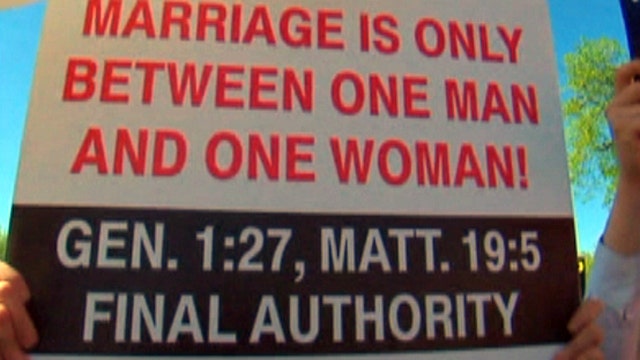Fear religious liberty is at risk
Jonathan Rauch and Paul Edwards react to concerns since gay marriage ruling
Four Kentucky couples are suing a clerk who is refusing to issue gay-marriage licenses – or any marriage licenses for that matter – following a landmark ruling from the Supreme Court giving same-sex marriage couples the legal right to marry.
The American Civil Liberties Union of Kentucky filed a federal lawsuit against Rowan County Clerk Kim Davis Thursday on behalf of two homosexual and two heterosexual couples, all of whom were turned down when they tried to get marriage licenses from Davis’ office this week.
Davis has said that her religious beliefs prevented her from complying with the Supreme Court decision, so she decided not to issue marriage licenses to any type of couple – straight or gay.
Davis is among a handful of judges and clerks across the South who have defied the Court’s order, maintaining that the right to “religious freedom” protects them from having to comply.
The Decatur County, Tennessee clerk and two office employees resigned Thursday due to their opposition to same-sex marriage, County Commissioner David Boroughs told The Jackson Sun.
However, in Alabama, all counties appeared to be complying with the Supreme Court ruling as of Thursday, lawyers representing gay couples told The Associated Press.
In Louisiana, where most parish clerks had been issuing same-sex marriage licenses since Monday, the state Office of Vital Records, which issues the licenses in New Orleans, didn't begin doing so until Thursday.
Following the Supreme Court’s ruling last Friday, Kentucky Gov. Steve Beshear ordered all clerks to fall in line. Kentucky Attorney General Jack Conway followed up with a warning that failing to do so might open them up to civil liability.
Officials have also warned defiant clerks could be risking criminal charges. Warren County Attorney Ann Milliken, president of the Kentucky County Attorneys Association, president of the Kentucky County Attorney’s Association, said clerks could be charged with official misconduct, a misdemeanor punishable by up to a year in jail.
Some Kentucky clerks who at first resisted issuing same-sex marriage licenses changed course this week aand agreed to sign them. However, Davis and a few others stood firm, despite the protests outside her Morehead office earlier this week.
She pledged to never issue a marriage license to a gay couple.
"It's a deep-rooted conviction; my conscience won't allow me to do that," Davis said Tuesday. "It goes against everything I hold dear, everything sacred in my life."
The lawsuit, filed in U.S. District Court in Ashland, requests and injunction ordering Davis to begin issuing licenses. IT alleges that her policy is unconstitutional and asks for punitive damages for violating the four couples’ rights.
April Miller and Karen Roberts, a couple for 11 years who live in Morehead, told The Associated Press that they asked for a license Tuesday and were told to try another county.
Another gay couple, L. Aaron Skaggs and Barry Spartman, called the Rowan County clerk's office Tuesday and asked to apply for a license. An employee on the phone said, "Don't bother coming down here," according to the lawsuit, and told them the clerk was refusing to issue licenses.
Two opposite-sex couples also tried to get licenses and were told by staff that none would be issued, the lawsuit alleges.
The clerks have argued that if they issue a license to no one, they cannot be accused of discrimination. Kentucky state law allows adult couples seeking marriage licenses to get them from any county. If a marriage involves minors, however, they must get their license in the county where they live.
The four couples who filed suit say that because they live, work, vote and pay taxes in Rowan County, they have a right to file for a marriage license there.
In the lawsuit, ACLU legal director William Sharp wrote that Davis' religious conviction "is not a compelling, important or legitimate government interest."
One of the attorneys who filed the lawsuit, Laura Landenwich, wrote that Davis "has the absolute right to believe whatever she wants about God, faith, and religion, but as a government official who swore an oath to uphold the law, she cannot pick and choose who she is going to serve, or which duties her office will perform based on her religious beliefs."
The Associated Press contributed to this report


